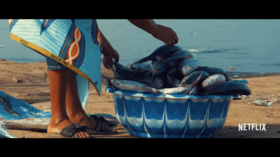Seaspiracy? Netflix’s new anti-fishing film that’s being lauded by celebrities has got more holes in it than a trawler’s net

A ‘shocking’ new documentary on Netflix warns we’ll run out of fish in just 27 years and urges us all to stop eating them now. But the only conspiracy at play here is how a supposedly factual film gets so many facts wrong.
Riding high in Netflix's most popular offerings this week is a documentary about fishing. No, it's not about middle-aged men enjoying a day at the river bank, but how humanity is destroying the planet by over-exploiting our seas and oceans. While Seaspiracy (awful title) makes some illuminating points along the way, its really shocking claims are mostly nonsense.
Made by 27-year-old British director Ali Tabrizi, the film is a grand tour of the planet, looking at everything from whaling in Japan and shark fishing in China to industrial trawlers off Africa and salmon farms in Scotland. The take-home message seems to be that fishing is as bad for the environment as climate change – or is, at least, the untold story of humanity's destruction of the planet.
Some celebrities have urged people to watch the film, with Canadian rocker Bryan Adams telling his fans to stop eating fish, while Chris Froome, the leading British cyclist, tweeted that his “mind has been blown” by the film.
Watch Seaspiracy. Please.
— ANNE-MARIE (@AnneMarie) March 28, 2021
But if a claim seems shocking, it might well be because this one, like so many eco-activist allegations and prophecies, doesn’t add up.
Tabrizi tells us that his first interest was the harm due to marine life by plastics in the oceans, but soon his interest turns to what we are doing more directly. We see how hunting whales, banned by most countries, is thriving in Japan. The first conspiracy is that this industry is aided and abetted by the government, police harassment of anyone seeking to uncover the truth, and even yakuza gangsters. We see dolphins captured to be sold to marine parks for high prices, but most of those herded into shallow waters to be slaughtered – apparently as scapegoats for the exhaustion of Japan's bluefin tuna stocks. No doubt Tabrizi is right to point out that it is overfishing, not dolphins, that is to blame for the diminishing numbers of bluefin. But why the conspiracy theory?
Then we're off to Hong Kong to see the reality of capturing and killing sharks simply for their fins. These are cut off and the rest of the shark's carcass tossed back into the water. Many other fish and mammals are caught up in huge trawler nets and tossed away as ‘by-catch.’
But why are dolphins and other large creatures being dumped? Aren't we supposed to be able to buy 'dolphin-safe' fish now? Tabrizi effectively tells us that certification schemes are a sham because they are easy to circumvent, and a conspiracy against well-meaning consumers. (The leading certification organisations have robustly defended themselves and claim that Tabrizi has taken comments made by staff wildly out of context.) And when observers on board fishing boats are honest, they face the risk of murder, assassinated in their homes or simply tossed overboard.
The claims come thick and fast. Killing apex predators like sharks leads to an overabundance of the species they would eat, in turn causing enormous pressure on the smaller species that they consume, eventually destroying the food chain. Phytoplankton – abundant, tiny plants – absorb far more carbon dioxide than the Amazon rainforest. Abundant fish also help to sequester carbon dioxide before dying and floating to the bottom of the sea. The mere churning of waters by fish helps to pull warmer water down into the oceans, keeping surface temperatures lower. It would take weeks to fact-check this blitzkrieg of so-called facts.
But here are a few that have been countered by critics. First, the idea that there is no such thing as 'sustainable' fishing. In fact, for relatively low cost, fisheries can be managed more sustainably. After all, it is in the interests of the fishing industry to make sure that there are enough fish around to catch in years to come.
Second is the notion that we'll run out of fish by 2048. This seems completely bonkers, based on a claim made in a study in 2006 which has since been rejected by its author. A more recent analysis suggests that two thirds of fisheries are overexploited, but could easily be made sustainable with appropriate management.
Third, returning to Tabrizi's original concerns about plastics, is the claim that 48% of the plastic in the ocean is fishing gear. In fact, this was from analysis of one ocean area. The UN Environment Programme thinks that abandoned, lost or otherwise discarded fishing gear makes up “less than 10 percent of global marine litter by volume, with land-based sources being the predominant cause of marine debris in coastal areas”.
This is not to trivialise the problem. Marine life can get caught in discarded fishing gear (termed 'ghost fishing'). This is a pointless waste. But according to a paper in Nature from 2015, a huge amount of the plastic waste in our oceans comes from river systems, overwhelmingly in Asia, where waste disposal systems are simply inadequate, so too much trash ends up in waterways and onwards to the sea.
Alarmist statements and outlandish claims simply undermine Tabrizi's case. Even the right-on New York Times has called the film “a sea of murky conspiratorial thinking.” It's also narcissistic, putting Tabrizi at the centre of the action and giving us his emotional reactions to what he's seen. And given he's supposed to be an environmentalist, it's rather grating that Tabrizi is jet-setting from one part of the globe to another. Or maybe these are Good Air Miles, as opposed to Bad Air Miles – those being the ones that us plebs produce when we go on holiday.
The real message of the film comes at the end. In short, says Tabrizi, there's no such thing as sustainable fish consumption, so we all just need to stop eating fish. Better still, go vegan. Hence, we have a short discussion at the end of the film about how fish feel pain, too. (Presumably, these are the same pain-feeling fish that we're happy for the sharks and dolphins to eat instead.)
Seaspiracy is dangerous nonsense. Billions of people rely on seafood to survive. The sea is a vital source of nutrition. Yet Tabrizi gives us a one-sided view of the problems. Perhaps it is just an oversight that Netflix's viewer advisory warns viewers of “animal killing,” but not about a clip of the apparent shooting dead of a fisherman. Were they so obsessed with the fish that they forgot to mention that?
Which is a shame, because there are some points that are valuable in the film. It is terrible that African fishermen are being deprived of a livelihood by huge trawlers from Europe and China. Trawling does do damage to the sea bed and better ways should be found to fish. We should have the political will to ensure that fisheries are sustainable, rather than clear up the mess afterwards, as happened in Canada's Grand Banks, where cod stocks collapsed in the early 1990s due to overfishing.
But balance and cool analysis are just not the way it works with eco-documentaries. Instead, like so many others before him, Tabrizi tosses unwanted nuance overboard.
Like this story? Share it with a friend!
The statements, views and opinions expressed in this column are solely those of the author and do not necessarily represent those of RT.















